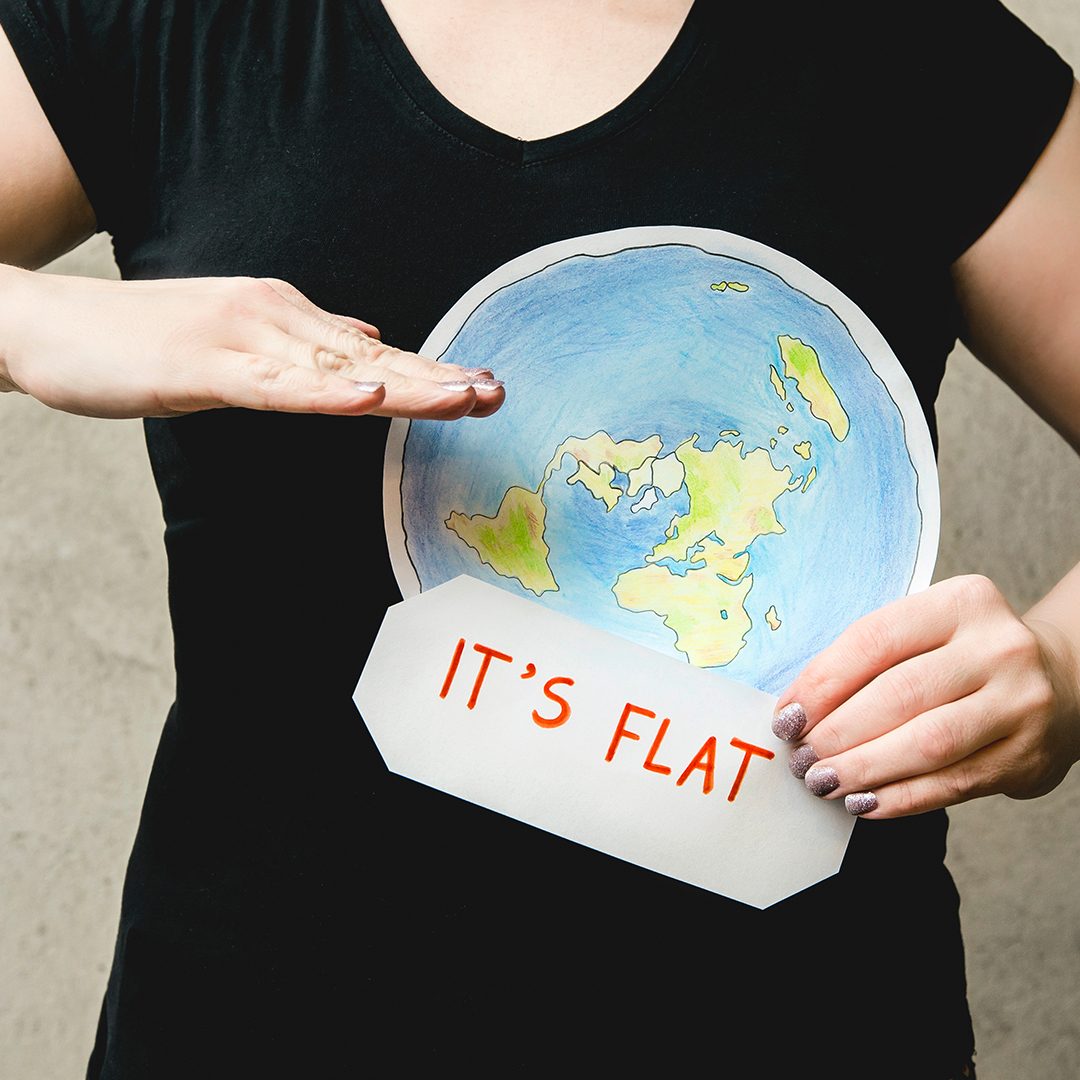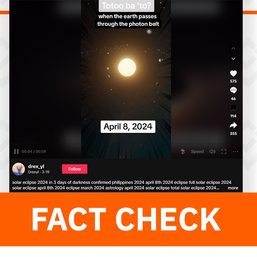SUMMARY
This is AI generated summarization, which may have errors. For context, always refer to the full article.

The world is awash with dangerous and unfounded ideas, but what do we do about them? That’s the central theme of the philosopher and science historian Lee McIntyre’s latest book, How to Talk to a Science Denier: Conversations with Flat Earthers, Climate Deniers, and Others Who Defy Reason. We caught up with him to see if there can be any meaningful dialogue with individuals who have rejected rational thought and whether their minds can ever be changed.
This conversation has been edited for length and clarity.
Coda Story: The title of “How to Talk to a Science Denier,” is pretty self-explanatory. It’s not an easy thing to do, though. Plenty of people believe that you can’t change the minds of individuals who have wholeheartedly embraced conspiracy theories and fake science, but is there actually a way to communicate with them effectively?
Lee McIntyre: You asked that question in exactly the right way. The title of the book is not “How to Convince a Science Denier that They Are Wrong.” It’s just about how you can succeed in having the initial conversation with them, how you can get them to listen. Whether or not you are ultimately able to change their minds depends on a number of factors.
My conclusion, after going out on the road and trying to do that with a variety of people, is that simply arguing with somebody over facts does not work. Everything depends on the approach that you take. If you’re patient and empathetic, and you show that you respect and can actually listen to the person, then you’ve got a much better chance of building trust and having them listen to you. In that kind of an environment, you at least create a chance for them to hear the facts. If you don’t approach them in the correct way, then all the facts you bring to them are useless.
If straight-up facts don’t work, can you appeal to people’s emotions? I’d have thought that would be particularly effective with, say, family members who have picked up bad ideas from their friends on Facebook.
You’ve put your finger on something important here. When you’re talking with people who presumably already love you and trust you, you’ve got a secret weapon. I heard a story recently about a woman who was talking to her dad about climate change, and he was just intransigent. She finally said, “Dad, why are you believing all of these strangers that you haven’t even met, and you won’t believe your own daughter?” That did the trick. She made it about trust and then the facts were actually accepted.
Given that we’re all surrounded by massive amounts of conflicting information every day, how do you easily recognize junk science? Are there any hallmarks that people should look out for?
The problem is that when somebody is hearing something that they want to believe is true, they tend to trust that source, even if it’s unreliable. Sometimes you can directly debunk that source, though. One of my main criteria is. “Does the person have something to sell?” If somebody has something to gain by denigrating the work of mainstream science, I think that should make you immediately suspicious. You know, people who present themselves as the next Galileo and say that they have all the answers and that the whole consensus of science is wrong… well, that’s just not likely to be true. Sometimes science does get it wrong. Sometimes the gadfly is correct, but it doesn’t happen very often. In fact, it’s a very rare occurrence.
It’s interesting that you mention that science occasionally gets things wrong. To me, that’s a big part of the scientific process: the ability to come to conclusions from observable findings and, crucially, to be able to change your mind when new and contradictory evidence comes along.
That’s right. The hallmark of science is an ability to change one’s mind when there’s new evidence, but people who will not change their mind, no matter what the evidence, they’re not doing science.
We hear the word “skeptic” used a lot these days — as a badge of pride and as a pejorative, depending which side of the fence you sit on. However, skepticism is a big and important part of scientific reasoning. What is the difference between useful skepticism and denialism?
I’ve never met a self-described science denier. I’ve only ever met skeptics. They always say there are more scientific in their approaches than the scientists, that they’re just being skeptical. And you’re right, skepticism is a very important part of science. But, think about the way scientists are skeptical. They’re open to new ideas, but they’re skeptical of whether they’re true until they’ve been tested. Once there’s sufficient evidence, they’re willing to make that leap and say, “This has good evidence. It is rational to believe that this is true. We understand that it may later be overturned by future evidence, but it is held up with our rigorous testing so far.” That’s a reasonable type of skepticism.
An unreasonable type of skepticism is when someone says, “I will not believe that, short of absolute proof.” That’s the kind of thing that a denier says about the things that they don’t want to believe. They don’t say it about the things that they do believe. Take the flat-earthers I’ve spoken to, for example. They always say they’re skeptics, but they’re gullible as hell. They’re skeptics about the things that they’re hearing from science, because they don’t want to believe that they’re true, but if some incredibly unreliable source has a photograph or a video that appears to back up their view, they’ll buy it hook, line and sinker.
I call what they do cafeteria skepticism. They go to the cafeteria and they pick out the things that they are going to be skeptical about and they’re not skeptical about anything else. That is not the way that scientists are supposed to reason.
If I had to distill your body of work down to a few words, I’d say that it concentrates on preserving and asserting the value of rational thought. For many people, this didn’t really seem like it needed defending so vigorously until the presidency of Donald Trump and the rise of global populism. The erosion of truth and empiricism has actually been taking place for a long time, though. What would you say was the real turning point?
Yeah, by the time Trump came along, we were already pretty far down that road. Trump wasn’t the cause of the post-truth world, he was the result. Actually, the turning point was back in the 1950s, when the idea of denialism became organized, when it became a campaign that was funded and planned by people with something to gain.
What I’m referring to here is when the big American tobacco companies all got together and had a meeting at the Plaza Hotel in New York City, because they were incredibly worried about a forthcoming scientific study that was going to show this link between cigarette smoking and lung cancer. Their public relations experts said, “You have to fight the science. You have to run a PR campaign that seeds doubt in everyone’s mind, so they don’t think that this science is true.”
So, that’s what they did. They took out full-page ads in newspapers and they hired their own scientists. They didn’t have to prove anything. All they had to do was raise doubt about the forthcoming study.
This story is well told in Erik Conway and Naomi Oreskes’ book “Merchants of Doubt.” It provided the blueprint for all of the science denial that came about after — about climate change, about anything, and it’s followed right up to the present day with Covid-19.
We really didn’t do anything about it, so science denial proceeded unchecked for the next 60 years. Then a very interesting thing happened, which is that political folks, for the most part on the right, looked at this and said, “Wow, look how successful they have been. If they can deny the truth about climate change, we can deny the truth about anything,” like how many people were at Trump’s inauguration, whether it rained on that day, whether the 2020 election was stolen or whether the people who attacked the U.S. Capitol on January 6 were peaceful protesters.
Even if there’s video footage, all they need is to raise a campaign of doubt and have their own people say, ’No, it’s not true,” and make an alternative narrative.
We’re very far down that road now — and we’re not at the end of it yet.
A significant number of people present science denial and conspiracy theory as the sole preserve of the right wing, be it for reasons of blunt populism or a die-hard belief in the sanctity of the free market. That’s not the whole story, though. As you point out in the book, people with liberal and left-wing sympathies can be susceptible to these narratives, too. What common ground do they have with their right-wing counterparts?
Well, they’re human.
We all have built in cognitive biases and we’re all susceptible to the effects of this sort of thing. That’s why we have anti-vaxxers on both the left and the right. That’s why we have members of the anti-genetically modified food movement on both the left and the right. The fact that right-wing operatives have had so much success with denial of climate change and evolution doesn’t mean that science denial is solely a right-wing problem. There is nothing to prevent it from the left. The minute we start thinking about science denial as somebody else’s problem or that our political values make us immune to it, then we’re in big trouble.
It’s something that we all need to watch because any sort of ideology can interfere with science. For the most part, scientists, I think, proceed in a very honest and straightforward manner, on the understanding that their results are going to be challenged by other scientists. When political values interfere with the investigation of empirical phenomena, when we’re allowing our political sympathies to tell us what is and isn’t actually true in the world as an empirical fact, that’s a very dangerous thing.
We’ve reached a point where science denial — for instance, disputing the impact of fossil fuels on the environment — is seen as an inevitable consequence of the vast sums of money at stake for certain industries. Now, we are in the middle of a global pandemic, which has thrown up a colossal amount of new and extremely questionable ideas. To me, it’s pretty difficult to tie a lot of them to financial imperatives and much easier to understand them within the context of a rising, belligerent strand of libertarianism and a growing mistrust of elites and experts.
It’s important to remember that what we sometimes call misinformation is, for the most part, actually disinformation, intentionally created by people with interests at stake, in order to mislead other people into believing that a false thing is true, so that they can benefit from it. Those benefits don’t have to be economic. Some of them are ideological. Like, the resistance to the theory of evolution is primarily from evangelical Christians. There’s no profit in it, but it is what they believe. What’s happened over the Covid-19 vaccines is the worst thing that could have happened for corporate America, having its business challenged by people not wanting to take the vaccines. So, why is that something that is happening on the political right? It’s an ideological gain, not an economic one.
OK, so conspiracy theories, fake science and denialism have been around for hundreds of years. One big difference between then and now is that they were usually transmitted by word of mouth and old media. The internet and algorithm-driven social platforms provide an incredibly efficient way to transmit ideas, both good and bad. What role do you think those businesses should be playing in countering science denial and are they doing enough?
We don’t have to drop propaganda leaflets from planes anymore. We don’t have to have somebody standing on a street corner handing out leaflets saying that the moon landing was faked. I think of cognitive bias as the fuel and the internet as the accelerant, the gasoline. All you need is a spark. So, yes, I think that the creators and amplifiers of disinformation are something that we really do need to focus on.
My book is about what to do once things have already gotten out of hand. Once the disinformation has been created and amplified, there are certain groups who want to believe it. There are ways that you can talk to them to try to get them out of it. However, I think you’ve also lost some of them and that, for them, the damage has been done.
I was reading a report on NPR the other day — and this was shocking to me — that said 65% of the anti-vax propaganda on Twitter was due to just 12 people. They’re obviously very prolific, but that would be impossible without the social media companies allowing it to happen. They have to do more to stop it. It’s not only tearing society apart, it’s literally killing people.
If you think about Facebook, they have a tremendous problem with disinformation. What they don’t have a problem with is, say, terrorism-related content or pornography. You do not see that on Facebook. Ask yourself why. The reason is because they have scrubbed it. Pornography, particularly. They have a human team that goes through it all and removes it. It’s got to be the worst job at Facebook, but they care about it. They could do the same thing for disinformation. They’ve definitely got enough money to.
It seems that quite a lot of people have accepted the rise of science denial and conspiracy theories as a negative but inescapable fact of modern life. Are we stuck with them, or do you think that we can realistically make a change for the better?
I think we can make a change for the better. I saw a documentary not long ago called “The Brainwashing of My Dad.” It was about a young woman whose father had become radicalized by conservative talk radio and TV news. He was spouting conspiracy theories and he was just a more hostile, angry person than he was before he encountered that information. Then, his radio broke and he came back to his family. He became a much calmer person. I think if that could happen for the rest of us, if we can find a way to handle the problem of disinformation creation and amplification. Then, our societies can return to a more normal type of functioning. That’s maybe another book. – Rappler.com
Lee McIntyre is a research fellow at the Center for Philosophy and History of Science at Boston University. “How to Talk to a Science Denier: Conversations with Flat Earthers, Climate Deniers, and Others Who Defy Reason” is published by the MIT Press.
This article has been republished from Coda Story with permission.
Add a comment
How does this make you feel?





There are no comments yet. Add your comment to start the conversation.